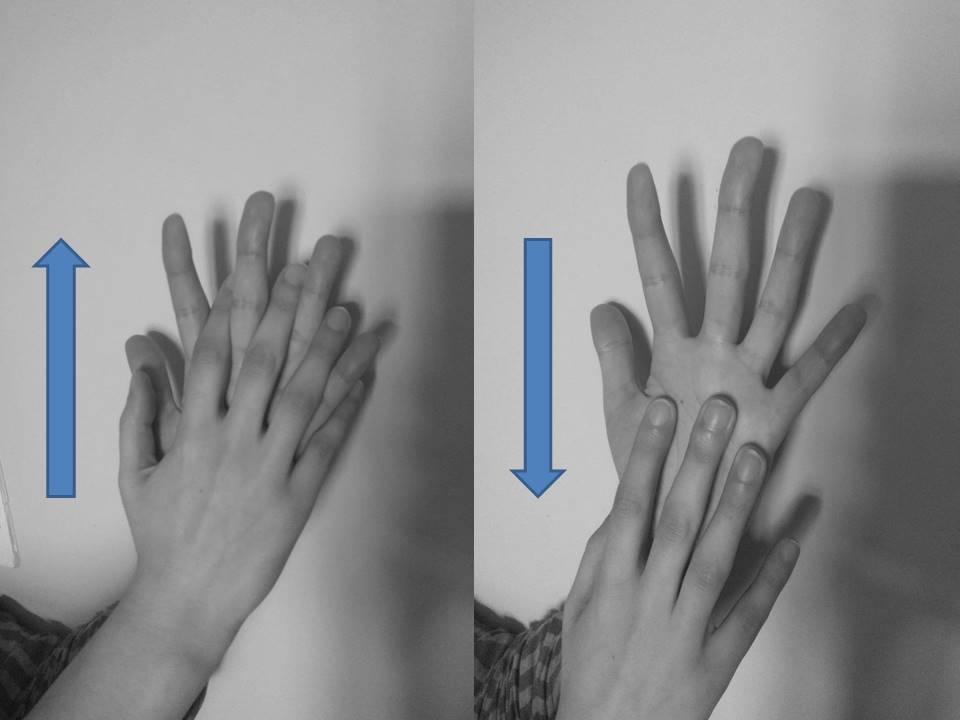用肢体语言搓手

Table of contents
搓手是一种常见的手势。 当你将手掌搓在一起时,这意味着你 期待积极 当人们对即将发生的事情感到兴奋时,就会做出这个手势。
当你要宣布一个关于自己的好消息时,你很可能会摩拳擦掌。 例如,"我刚刚升职了 "或 "我马上就要结婚了"。
当你要看一部想看很久的电影时,你可能会在电影一开始时就搓搓手;或者举个简单的例子,当你要吃你最喜欢的饭菜时,你可能会一边 "嗯...... "一边做这个手势。
搓手的速度
一个人搓手掌的速度可以表达不同的含义。 快速搓手掌可以表达对自己的积极期望,而缓慢搓手掌则有两种含义:
- 慢慢搓手意味着你打算伤害别人。 想想邪恶、诡计多端的卡通恶棍。
- 手指交错慢慢搓手,预示着怀疑的情绪1。
 交错擦手
交错擦手 假设你正在与一位商人谈判一笔交易。 你明确地告诉他你想从这笔交易中得到什么,并提出了你的条件。 商人研究了你的条件后告诉你:"我可以给你你想要的东西",同时他的手掌快速地摩擦着。
在这一点上,你可以肯定,他即将给你提供的交易对他来说是非常好的,否则他不会这样摩拳擦掌。
现在,在他提出交易之后,假设你告诉他:"哦!我忘了提另外一个条件...... "你提到了一个对他不利的条件。
这时,你可能会看到这位商人慢慢地搓着手,脸上露出担忧的表情。 很明显,他现在对这笔交易产生了怀疑,可能认为这笔交易对他来说已经不再重要了。
在他说出 "不 "之前,最好先问问他有什么烦恼。
一旦别人说了 "不",你就很难再说服他们,让他们改变说法。 你甚至可以考虑撤回你的最新条件,以挽救这笔交易。
因此,只需观察他们搓手的方式,你就能在拒绝发生之前察觉到它。 这样,你就能在对方做出任何具体决定之前改变你的做法。
用手指搓手
一只手(通常是右手)的手指在另一只手的手掌上上下缓慢摩擦。
See_also: 如何让工作过得更快(10 个小窍门)
这种手势通常伴有握紧双手的手势,表示自我克制。
当人们需要做出艰难决定但又感到困惑时,就会做出这样的手势。
See_also: 心理学中的安慰剂效应假设你要求某人做出决定。 你看到他做了这个手势,然后紧握双手。 你需要改变方法,让他打破自我约束的状态。
有趣的是,给他们一些可以拿的东西,比如一支笔或一杯咖啡,可能会有效地让他们采取更开放的态度。
在肢体语言中,手势的变化会导致情绪状态的变化,正如情绪状态的变化会导致手势的变化2。
手掌在膝盖上摩擦
坐着的时候,当人们感到压力或紧张时,可能会把手放在膝盖上摩擦。 这是一个准确的不舒服指标,但在桌下却经常被忽略。 当一个人准备站起来离开不舒服的社交场合时,经常会观察到这种现象。
当我们试图表达对动物无害的态度时,我们会用手掌反复摩擦动物的皮毛。 我们期望这样做能安抚动物。
同样,当我们把手掌放在膝盖上摩擦时,我们是在试图安抚自己,因为我们在情绪上感到不舒服。
隐藏手掌
展示手掌是一种普遍的诚实和开放的姿态。 当一个人说话时展示手掌,你可以相当肯定他说的是实话。
如果露出手掌表示诚实,那么藏起手掌就表示不诚实,对吗? 不一定。
有时,隐藏手掌可能意味着对方在撒谎,但这并不是一个可靠的线索,因为除了撒谎之外,对方还可能出于其他原因无意识地想躲着你。
例如,如果一个人很紧张或有自我形象问题,他可能会把手掌藏在口袋里,即使他说的是实话。
自我形象问题是一个人把手藏在口袋里的常见原因。 如果一个人不喜欢自己的外表、穿着或发型,就很可能把手放在口袋里。
仅仅认为自己陷入了尴尬的境地,可能会让你把手放在口袋里 "躲起来"。

潜意识有自己的理由,而这些理由在意识看来是不合逻辑的。 它认为,让你把手放在口袋里,就是在帮你躲藏。
回顾积极的事情
人们不仅会在期待积极的事情时用力搓手,而且还会在回忆积极的事情时用力搓手。 在受访者回忆复仇的往事时,我们就观察到了这一点3。
没有人知道我们为什么会在期待或回忆积极的事情时搓手。 也许这是我们的祖先在进食前清洁双手的一种方式。
也许这只是他们在寒冷气候中取暖的一种方式,这种行为在某种程度上与积极的期望联系在一起。
我迫不及待地想知道真正的原因(搓手)。
参考资料
- Marusca, L. (2014)。"每个人都在说什么"--前联邦调查局特工速读人物指南。 媒体研究杂志 , 7 (3), 89.
- Koob, M. (2016). 书评:艾米-卡迪(Amy Cuddy)的《存在:用最大胆的自我迎接最大的挑战》(Presence: Bring your boldest self to your biggest challenges)。 伦敦政治经济学院书评 .
- Denning, S. (2005). 驯服葡萄藤的故事。 知识管理与叙事 , 73-100.

